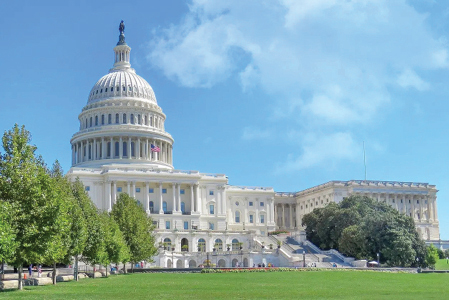|
By Cecile Entleitner, Senior Associate,
Blakey & Agnew
With only two months remaining in the current federal fiscal year, both chambers of Congress have made some progress in developing their funding proposals for fiscal year 2023, which begins on October 1. However, several factors could complicate the passage of a final, full-year appropriations package for federal agencies by this looming deadline. Separately, Congressional Democrats are working to advance their budget reconciliation bill, aiming to curb inflation, reduce deficits, and invest billions in various policy priorities.
On July 21, the House of Representatives passed an FY23 funding package containing six of the twelve annual appropriations bills. The legislation, which passed by a party-line vote of 220-207, included funds for Transportation, Housing, and Urban Development (THUD); Agriculture, Rural Development, and Food and Drug Administration; Energy and Water Development; Financial Services and General Government; Interior and Environment; and Military Construction and Veterans Affairs.
The THUD section of the bill would provide $105.4 billion in total budgetary resources for the U.S. Department of Transportation (USDOT), a $2.4 billion increase over 2022. It includes additional funding for three major grant programs with freight project eligibility, which is supplemental to the nearly $3 billion combined total already allocated to these programs for FY23 by the Bipartisan Infrastructure Law (BIL). The bill would add $778 million for the Rebuilding American Infrastructure with Sustainability and Equity (RAISE) Program, $630 million for the Consolidated Rail Infrastructure and Safety Improvements (CRISI) Program, and $300 million for Port Infrastructure Development Program (PIDP) grants.
In late July, the Senate introduced its own FY23 funding proposals, which are still pending consideration. While similar to the House bill, the Senate THUD legislation’s proposed total funding for USDOT is slightly higher at $106.6 billion and includes different amounts for the grant programs of interest to freight stakeholders. The Senate version would provide $1.09 billion for the RAISE grant program, over $300 million more than the House-passed bill. However, the $535 million proposed for CRISI and the $234 million for PIDP grants are both lower than the funding included in the House bill. As in the House version, these amounts would be added to the FY23 BIL funding for RAISE, CRISI, and PIDP. Neither chamber chose to appropriate additional funds for the freight-focused INFRA grant program or the new megaprojects grant program. These programs will still receive the FY23 amounts allocated under the BIL, which provided $1.64 billion for INFRA and $1 billion for MEGA.
Republicans in both chambers have opposed all FY23 appropriations bills as currently drafted, arguing the measures promote partisan priorities and wasteful spending. Given the thin margins in both the House and Senate, upcoming midterm elections, and the scheduled August recess, passing an appropriations package before the new fiscal year begins will be extremely challenging. To prevent a government shutdown, Congress may instead enact a continuing resolution, temporarily extending appropriations for federal agencies at FY22 funding levels. Senate Appropriations Chairman Leahy (D-VT) cautioned against such a stopgap solution and called for the passage of a full-year funding bill as soon as possible, noting that a
|

long-term continuing resolution would not account for inflationary cost increases.
At the same time, Democrats are hoping to move forward with their budget reconciliation bill, a significant policy priority that also faces a September 30 deadline. On July 28, Senate Majority Leader Schumer (D-NY) and Senator Manchin (D-WV) announced they had reached an agreement on the draft proposal – dubbed the Inflation Reduction Act – surprising many who had been under the impression that the reconciliation negotiations had stalled. Democrats estimate the bill would invest over $430 billion in energy, climate, and health care provisions and raise nearly $740 billion in revenue through corporate taxes, IRS enforcement, and prescription drug pricing reform – reducing the federal deficit by more than $300 billion.
Among other transportation-related provisions, the Inflation Reduction Act would provide $3 billion for a grant program administered by the Environmental Protection Agency (EPA) to help ports purchase zero-emission equipment and develop climate action plans. The EPA would also receive $1 billion for grants and rebates to replace Class 6 or 7 trucks with zero-emission vehicles and purchase related charging infrastructure. The proposal further includes funding for a sustainable aviation fuel grant program, neighborhood access and equity grants administered by the Federal Highway Administration (FHWA), the facilitation of FHWA environmental reviews of proposed infrastructure projects, as well as tax credits for passenger and certain commercial electric vehicles.
The legislation is currently under review by the Senate Parliamentarian to ensure the bill text meets Senate reconciliation requirements, which state all provisions must directly impact federal spending or revenue. Budget reconciliation bills are not subject to the Senate filibuster, thereby allowing them to pass by a simple majority of 51 votes rather than the 60 votes required for most other bills. To advance the legislation, Senate Democrats will need unified support from all 50 caucus members and Vice President Harris’ vote to serve as the tiebreaker. Additionally, Senators may offer an unlimited number of substantive amendments to reconciliation bills on the floor, which will all receive a roll call vote. Because of these specific requirements, any absence of a Democratic Senator – due to a COVID infection or otherwise – or opposition by a single caucus member could jeopardize an amendment roll call vote as well as passage of the overall package.
If the legislation advances through the Senate, the House would return from recess for a vote and – if passed – would send the bill to President Biden’s desk for approval, marking a significant achievement for his party’s platform just ahead of the midterm elections.
Blakey & Agnew, LLC is a public affairs and
communications consulting firm based in
Washington, DC.
|

